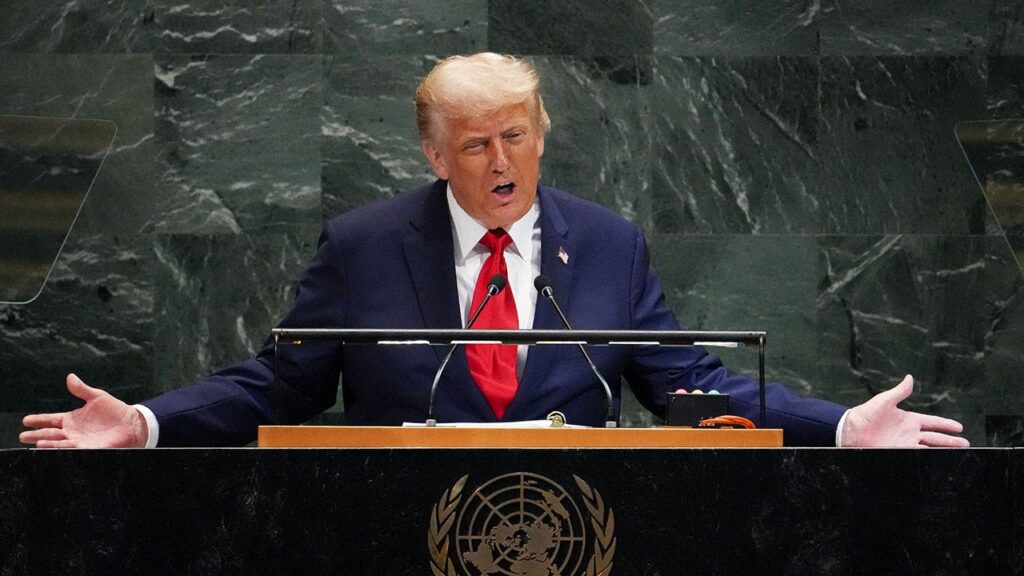In a recent address to the United Nations General Assembly, President Donald Trump urged European NATO allies to sever their dependence on Russian oil. He emphasized the irony of European nations funding a war that threatens their own security by continuing to purchase energy from Russia. The President’s comments come in the context of ongoing geopolitical tensions following Russia’s invasion of Ukraine, highlighting the urgent need for a united front against Russian aggression.
| Article Subheadings |
|---|
| 1) Urging Immediate Action on Energy Imports |
| 2) Impact of Russian Energy on European Security |
| 3) Historical Context of European-Russian Relations |
| 4) Proposed U.S. Sanctions and Their Potential Effects |
| 5) Future Dialogues with European Leaders |
Urging Immediate Action on Energy Imports
During his address on September 23, 2025, at the United Nations in New York City, President Trump criticized NATO members for continuing to rely on Russian oil, framing this reliance as self-sabotage amidst a conflict involving Ukraine. He highlighted that countries like China and India are benefiting from this dependency, thereby fueling Russian aggression in the region. By stating that “Europe has to step it up,” Trump is calling for immediate cessation of energy purchases from Russia, positioning this demand as not only vital for European sovereignty but also critical for global stability.
Impact of Russian Energy on European Security
European nations have exacerbated their vulnerabilities by maintaining energy imports from Russia, especially since the onset of the Ukraine crisis in February 2022. Countries such as Hungary, Slovakia, France, Belgium, and Spain continue to be among the largest importers of Russian energy, despite a widespread realization of the dangers posed by this dependency.
“Who the hell ever heard of that one?”
Trump remarked in disbelief at the idea of funding an adversary. This dichotomy raises questions regarding the cohesion of NATO and its collective strategy against Russian foreign policy.
Historical Context of European-Russian Relations
The roots of Europe’s dependence on Russian energy stretch back decades, as the region has long relied on Russia for oil and gas supplies. This relationship has been maintained under various economic agreements and has proven resilient despite ongoing political tensions. Following Russia’s actions in Ukraine, European nations began reassessing their energy strategies, yet challenges remain, particularly due to long-term contracts and the integrity of their supply lines, exemplified by France’s pre-existing “take or pay” agreements which perpetuate its energy imports.
Proposed U.S. Sanctions and Their Potential Effects
In his speech, Trump outlined a potential strategy involving substantial economic sanctions should diplomatic efforts falter. He argued that robust tariffs could be implemented to deter Russia’s actions in Ukraine, contingent upon European cooperation in enforcing similar measures. “In the event that Russia is not ready to make a deal to end the war, then the United States is fully prepared to impose a very strong round of powerful tariffs,” he stated. This emphasis on collective action underscores the interconnectedness of international relations and the significant role that European compliance will play in any successful sanctions protocol.
Future Dialogues with European Leaders
Positioning himself as a key player in its implementation, Trump intends to engage directly with European leaders during his time at the UN. His comments have stirred up a mixture of support and apprehension among allied nations. While some officials may appreciate the call to action, others might view it as premature or overly aggressive, fearing repercussions on their national economies. Moving forward, the outcome of these discussions will likely shape NATO’s strategy towards Russia and its collective approach to energy security.
| No. | Key Points |
|---|---|
| 1 | President Trump demands that NATO allies halt Russian oil purchases to impede funding for the ongoing war. |
| 2 | European nations, despite reducing reliance on Russian oil, still import significant quantities, particularly France and Hungary. |
| 3 | Russia’s energy dependence on Europe has historical roots and remains complex due to existing contracts. |
| 4 | Trump proposes strong U.S. tariffs as leverage to compel European cooperation in sanctions against Russia. |
| 5 | Future dialogues between Trump and European leaders may significantly influence NATO’s strategy regarding Russia. |
Summary
President Donald Trump‘s insistence on European allies severing ties with Russian energy imports serves as a critical reminder of the intricate balance of international relations. His remarks at the UN reflect both urgency and the complexities involved in achieving a unified front against Russian aggression. The ongoing discussions regarding energy dependency and sanctions may set the stage for future security arrangements, underscoring NATO’s commitment to collective defense and the necessity for cohesive actions among member states.
Frequently Asked Questions
Question: Why does Trump focus on Russian energy imports?
Trump believes that European countries continuing to purchase Russian energy are indirectly funding the conflict and jeopardizing their security, making the need for cessation urgent.
Question: What measures does Trump propose if Russia does not engage in peace negotiations?
He has suggested that the United States is prepared to impose robust tariffs that could deter further aggression, contingent on European nations joining in these actions.
Question: How have European nations responded to Russian energy dependence post-invasion of Ukraine?
Many European nations have made strides to reduce dependency since the invasion in 2022 but still face challenges due to existing contracts and trade practices.
